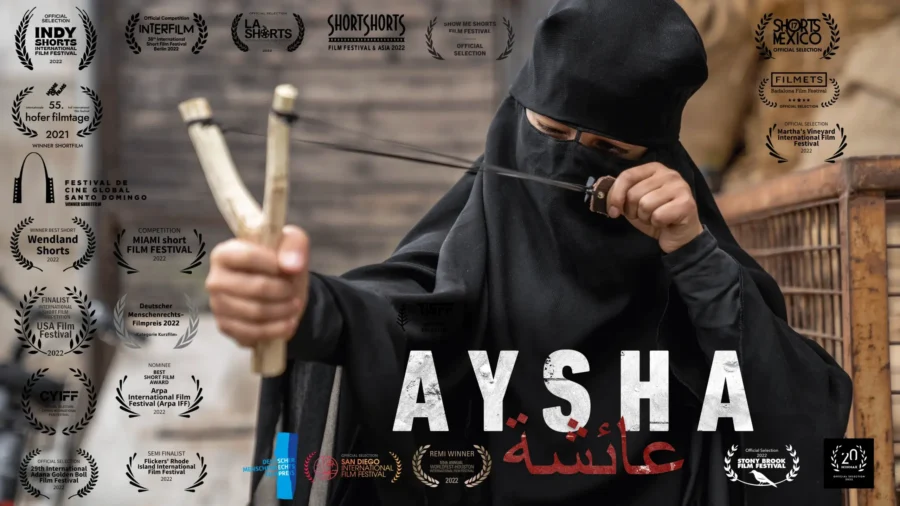The Art of Authentic Storytelling
Cengiz Akaygün has established himself as a significant figure in the dynamic German film landscape, deeply rooted in Stuttgart’s vibrant film scene. As a member of the German Film Academy and residing in the state capital of Baden-Württemberg, Akaygün embodies an artistic approach characterized by a deep commitment to socially relevant narratives and the cultivation of a distinctive visual language. His films are known for making a strong statement for authentic storytelling and developing a memorable visual language.
At the heart of his work to date is the short film “Aysha,” a work that was not only critically acclaimed but also embarked on a remarkable journey to become a candidate for the 95th Academy Awards in 2023. This recognition underscores the global resonance of his work. Akaygün’s roots in Stuttgart and the support from regional funding institutions like the Medien- und Filmgesellschaft Baden-Württemberg (MFG), which, for example, supports his upcoming short film project “Leylas Test,” indicate a fertile environment for his type of filmmaking. It is an environment that fosters artists dedicated to social issues and who cultivate an authentic narrative style. This suggests that Stuttgart and the Baden-Württemberg region are not just geographical locations for Akaygün, but active centers that nourish and promote a specific kind of cinema: socially engaged and authentic storytelling. This significantly contributes to the diversity and depth of national cinema. This article explores Akaygün’s career, his artistic philosophy, and the multifaceted layers of “Aysha” to offer “The Art Times” readers crucial insights into his work.

Cengiz Akaygün, The Journey and Vision of a Filmmaker
Cengiz Akaygün’s artistic journey is inextricably linked to his personal experiences. He came to Germany from Turkey at the age of eight, an experience that profoundly shaped his worldview and formed him as a filmmaker. He himself explains that recognizing the injustices his family faced had a strong influence on his work and motivated him to “hold a mirror up to people, especially to himself.” This deeply personal foundation makes his films appear not as mere intellectual exercises, but as works imbued with a deep, lived empathy. This personal connection significantly contributes to the “distinctive visual language” and emotional depth of his narratives perceived by critics, making his storytelling authentic and impactful.
Akaygün primarily works as a screenwriter and director, taking on both roles for many of his films, including “Aysha,” “The Mandarin Tree,” “The Barber,” “Free Monkeys,” and “Tesbih.” He is also the head of Free Monkey Film, his own production company, which produced “Aysha” and “Tesbih (The Prayer Beads).” The “Free Monkey” brand is also found in the title of his 2014 short film “Free Monkeys.” This independence is a central feature of his work. Akaygün sees independent filmmaking as a way to realize his visions. For “Aysha,” he took on the entire production himself, without external funding, relying on reserves, partial payments, and sponsorship for catering and equipment. He works with a diverse team of professional filmmakers, film students, and even family members, prioritizing shared vision and commitment over fame or company size. This approach illustrates a resilient, artistically driven model of independent cinema, where creative control and thematic integrity are paramount. Akaygün’s ability to self-produce and collaborate with a dedicated, diverse team, rather than relying solely on traditional industry funding, demonstrates an inventive approach that could serve as a model for other aspiring filmmakers seeking to maintain artistic autonomy.
His artistic philosophy is characterized by a “special eye for socially relevant themes” and a commitment to “authentic storytelling and a distinctive visual language.” He seeks “profound stories in which the viewer can recognize different levels and find their truth,” and wants to “tell stories that move but do not explain or transfigure too much.” For him, dramaturgy is the “melody of his stories,” creating tension and emotionally engaging the audience. Beyond his creative work, Akaygün is actively involved in the film community, serving as a juror at film festivals (such as the Indian Film Festival Stuttgart), leading film projects with young people, and sharing his knowledge as a lecturer. This commitment underscores his role as an important player in the entire film ecosystem and his endeavor to foster new talent.
| Year | Title | Type | Genre | Role | Production Company / Client | Notes |
| 2026 (planned) | RESET | Feature Film | Drama | Author, Director | Team Werk : Die Filmproduktion | |
| 2025 (planned) | Leylas Test | Short Film | Drama | Author, Director | Niama Film | Realized with support from MFG |
| 2021 | AYSHA | Short Film | Drama | Author, Director | Free Monkey Film | Candidate for the 95th Academy Awards 2023; Short Feature Film Award Hofer Filmtage 2021 |
| 2020/2021 | Tesbih (The Prayer Beads) | Short Film | Drama | Author, Director | Free Monkey Film | |
| 2019 | Fünf Steine | Feature Film | Drama | Author | Niama Film, Lutzfilm | |
| 2017/2018 | Der Mandarinenbaum | Short Film | Drama | Screenwriter, Director | Lutzfilm | |
| 2016 | Der Barbier | Short Film | Crime | Author, Director | AC Films | |
| 2014 | Free Monkeys | Short Film | Thriller | Author, Director | AC Films |

“Aysha”: A Chamber Play on War and Identity
Narrative and Setting
“Aysha” is a concise drama, with a running time between eleven and twelve minutes. The film is staged as a chamber play and takes place in the intimate, confined courtyard of a war-torn house. Akaygün masterfully uses the soundscape, such as “sounds of approaching fighter jets,” to convey the acute, universal threat of war. This makes the exact geographical location less crucial than the omnipresent atmosphere of danger.
The plot focuses on Aysha, a child initially perceived as a fully veiled girl, her sister, and their mother. The mother tries to enforce religious practices (reciting from the Quran), while Aysha resists, preferring to play with a slingshot. A crucial revelation unfolds: Aysha is a boy disguised as a girl – a desperate tactic by the family to flee unrecognized. He harbors a desire to fight for his country, similar to his father, who was murdered by militias. A bloodstain on the wall symbolizes this harsh reality. The dramatic tension escalates when Aysha hits the mother with a stone. The film captures this intense moment through “intimate glances into the faces of the three actors.” The film ends with Aysha’s submission and the family’s departure from the courtyard, leaving the slingshot behind – a powerful, ambiguous symbol.
Profound Thematic Layers
“Aysha” powerfully illuminates the constant threat of war and displacement, universalizing these experiences beyond the specific Syrian context. A central theme is Aysha’s gender identity and the disguise as a survival tactic, highlighting the extreme measures people take in conflict zones. It questions traditional notions of identity under extreme pressure. Aysha’s rebellion and his desire to fight, mirroring his murdered father, embody desperate civilian resistance and the deep trauma of loss. The slingshot and the bloodstain serve as powerful symbols of this struggle.
The film also explores the intimate dynamics within the family, particularly the conflict between survival strategies (religious disguise) and the child’s innate desire for agency and revenge. The final image of the slingshot can be interpreted in multiple ways: as a farewell to home and childhood, or as a disturbing hint that “the seed of violence could still sprout,” offering a nuanced perspective on the cycle of conflict.
Directorial Craft and Performances
Akaygün’s direction is praised for staging a “very dense and pointedly directed short film” as well as for its “formal and thematic coherence, convincing visual and sound aesthetics.” The film’s strength lies in conveying “the whole complexity and hopelessness of the situation” with “only a few dialogues.” Halima Ilter, who plays the mother, delivers the “most remarkable performance,” conveying “great subtle pain.” While other performances (Jiyan Akaygün, Ecem Türkmen) are described as “average,” the film as a whole “mostly works as a whole.”
Critical remarks suggested that the direction could have been “more focused” and the storytelling “more economical,” with moments of “dead air” that did not enhance the dramatic tension. Despite these points, the film’s potential was recognized. The film’s brevity, its confinement to a single location, and minimal dialogue contrast with the profound, universal themes it addresses. This is achieved through the skillful use of sound design (approaching fighter jets) and strong visual symbols (bloodstain, slingshot). Akaygün himself has stated that he wants to tell stories that “do not explain or transfigure too much.” This demonstrates his mastery of cinematic economy and his trust in the audience’s interpretive ability – a hallmark of compelling arthouse and short films.
Although the film is set in a specific Syrian context and features a Kurdish family whose disguise is linked to the “unrecognized escape” of the Kurdish minority, it manages to achieve universal relevance. Critics note that the film makes the “acute threat of a war clear regardless of the exact location” and its significance is “universal.” The specific cultural and political details serve as a powerful starting point to explore universal human experiences of survival, identity, and resistance under extreme pressure. Akaygün effectively uses a deeply personal and culturally rooted narrative to illuminate broader human conditions. This approach allows “Aysha” to reach a global audience and contribute to its international recognition by opening a specific window to universal struggles.

Critical Acclaim and Industry Presence
“Aysha” has received remarkable international recognition. The film was a candidate for the 95th Academy Awards in 2023 and received the Short Feature Film Award at the renowned Hofer Filmtage in 2021. Furthermore, it was awarded the “Prädikat besonders wertvoll” (particularly valuable) by the German Film and Media Assessment (FBW), an important national award for artistic quality.
The presence of “Aysha” at numerous international festivals underscores its global appeal. These include screenings at Shorts Mexico in September 2022, the Thessaloniki International Short Film Festival in October 2022, the Martha’s Vineyard International Film Festival in September 2022, the London Kurdish Film Festival in October 2022, the Miami Short Film Festival in November 2022, the International Adana Golden Boll Film Festival in September 2022, and the Filmets Badalona Film Festival in October 2022.
The general critical reception has been positive, acknowledging the “compelling premise” and the effective portrayal of a “decent scene.” The film was praised for its “formal and thematic coherence, convincing visual and sound aesthetics, and strong acting performances,” making it an “excellent basis for discussion.” In particular, Halima Ilter, portraying Aysha’s mother, received special recognition for her “most remarkable performance,” conveying “great subtle pain.” Constructive criticism included suggestions that the direction could have been “more focused” and the storytelling “more economical,” with some moments of “dead air” that did not enhance the dramatic tension. Despite these points, the reviewer acknowledged the film’s “potential.”
The fact that “Aysha,” a short film of only eleven to twelve minutes, achieved an Oscar candidacy and a significant national award (Hofer Filmtage) as well as the “Prädikat besonders wertvoll” is remarkable. Despite its brevity, critics highlight that the film stimulates discussions and exhibits strong formal and thematic coherence. This shows that short films are not just stepping stones for aspiring directors, but can achieve significant industry recognition and cultural impact in their own right. It underscores the idea that powerful, concise storytelling, regardless of length, can earn top accolades and spark important conversations in the art and film world. For “The Art Times” audience, this emphasizes the importance of the short film as a serious and impactful artistic medium.
It is interesting to consider the apparent discrepancy between the high accolades and the specific critical suggestions for improvement. While “Aysha” received great recognition and important nominations, a detailed review also pointed out areas that could be improved, such as the feeling of “incompleteness” due to the focus on a single scene and suggestions for “more focused” direction and “more economical” storytelling. This tension between high industry recognition and specific critical refinement suggestions is noteworthy. It is not a contradiction in quality, but an indication of growth potential. For a director like Akaygün, who is committed to authentic storytelling and a distinctive visual language, incorporating such nuanced feedback into his upcoming projects, such as the feature film “Reset” and the short film “Leylas Test,” could lead to even more impactful and structurally complete cinematic experiences. This suggests an artist in a dynamic, evolving phase of his career, constantly refining his craft.

The Way Forward: Future Projects and Lasting Impact
Cengiz Akaygün has two promising projects in the pipeline that underscore his continued creative output and ambition. “Leylas Test,” a short film, is planned for 2025. Conceived as a drama, Akaygün is responsible for both writing and directing. This project is produced by Niama Film and receives remarkable support from the MFG (Medien- und Filmgesellschaft Baden-Württemberg). In parallel, the feature film “Reset” is scheduled for 2026. Also a drama, Akaygün will again be credited as author and director, with Team Werk : Die Filmproduktion as producer. These projects signal a strategic and organic progression in Akaygün’s career. The success and recognition of his short films, such as the Oscar candidacy of “Aysha,” undoubtedly provide him with the necessary momentum and credibility to secure funding for and transition to feature-length narratives. The regional funding for his short film suggests that such institutions play a crucial role in nurturing talent and enabling filmmakers to develop their craft, potentially serving as an important bridge to larger productions like “Reset.” This illustrates a viable and supported career path for independent filmmakers in Germany.
His earlier filmography includes works such as “Fünf Steine” (2019, feature film, drama, author) with Niama Film and Lutzfilm, and “Tesbih (The Prayer Beads)” (2020/2021, drama, author/director, Free Monkey Film). As early as 2019, he actively worked with Duc-Thi Bui on “The Five Stones” (likely “Fünf Steine”). His earlier short films include “The Mandarin Tree” (2017/2018, drama, director/screenwriter, Lutzfilm), “The Barber” (2016, crime, director/author, AC Films), and “Free Monkeys” (2014, thriller, director/author, AC Films). In 2018, he also worked on a screenplay for his first feature film “Mira & The Ghost from the Beach,” which may be an earlier title for “Reset” or a separate, unlisted project.
The consistent presence of the drama genre in his upcoming and past projects underscores his established focus on “socially relevant themes” and “authentic storytelling.” Although the specific plot details of “Reset” and “Leylas Test” are not fully known, this genre continuity, combined with his artistic philosophy, strongly suggests that these new dramas will continue to explore complex human conditions and societal issues. The earlier mention of “Mira & The Ghost from the Beach,” which deals with social injustice, further supports this. The continued support from the MFG for “Leylas Test” indicates ongoing institutional recognition of his artistic vision and its cultural value. This points to a deepening and broadening of his dramatic scope, rather than a departure from his core interests. For “The Art Times” readers, this means they can expect “Reset” and “Leylas Test” to continue challenging audiences with poignant, thought-provoking narratives that build on the success and thematic depth of “Aysha.” This positions him as a director with a consistent, evolving artistic agenda.
These projects signal Akaygün’s strategic transition to feature filmmaking while simultaneously maintaining his commitment to the short film format. This dual focus allows him to explore complex narratives and themes across various film lengths. His continued production is expected to further solidify his reputation as a compelling and significant voice in contemporary German cinema, particularly in the realm of socially conscious and emotionally resonant storytelling.

A Vision for The Art Times
Cengiz Akaygün has established himself as a compelling and authentic voice in contemporary German cinema, a filmmaker who consistently “holds a mirror up to people.” His unique ability to create deeply resonant, socially relevant stories that transcend cultural boundaries has been impressively demonstrated by “Aysha” and its journey to an Oscar candidacy.
Akaygün’s ongoing contribution to the film landscape is visible not only in his impactful creative output but also in his active engagement with the broader film community as a juror and mentor. His work embodies a vital current in modern filmmaking, offering profound insights and a “distinctive visual language” that continues to captivate and provoke thought in a global audience. With the eagerly anticipated releases of “Leylas Test” and “Reset,” Cengiz Akaygün is undoubtedly a director whose development will be closely watched in the coming years.









